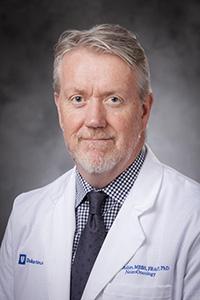
David M. Ashley, MBBS (Hon), FRACP, PhD, has been named director of the Preston Robert Tisch Brain Tumor Center at Duke as of March 1, 2018. He succeeds Darell Bigner, MD, PhD, who became director emeritus on February 1.
Before leaving Australia to join Duke in 2017 as professor of neurosurgery and director of the pediatric neuro-oncology program in the Department of Neurosurgery, Ashley had served as chair of the Department of Medicine at Deakin University, the program director of Cancer Services University Hospital Barwon Health, and executive director of the Western Alliance Academic Health Science Centre. He was also a director of the Victorian Cancer Agency Consultative Council, director of Clinical Trials Australia, and has been an Academy member of the Australian National Health and Medical Research Council since 2010. He also served as associate professor and director of the Children’s Cancer Center at the Royal Children’s Hospital in Melbourne, the largest children’s cancer treatment center in Australia.
Ashley is credentialed in both pediatric and adult oncology practice. His peer-reviewed publication record is diverse and includes laboratory-based cancer research, clinical trials, public health and psycho-oncology research. His primary academic focus in brain tumors has been tumor immunology and the genomics and epigenetics of cancer. His achievements in research have led to change in practice in the care of children and adults with brain tumors including the introduction of new standards of practice for the delivery of systemic therapy.
A senior figure and opinion leader in academic neuro-oncology and cancer medicine, Ashley is internationally recognized. He has been the principal investigator of a number of important Australian national and international studies, both clinical and pre-clinical.
Ashley says he recognizes and respects the enormous impact the team at the Preston Robert Tisch Brain Tumor Center has had on brain tumor clinical care and research across the globe. “In choosing to accept a position at the Brain Tumor Center at Duke in 2017, I had made a deliberate and considered move from the other side of the world to embed myself in an environment where I believe together we can make a substantial contribution to improving outcomes for patients who suffer from brain tumors,” says Ashley. “As director of this outstanding team, I intend to build capacity by leveraging the very substantial experience and platforms that already exist at Duke, through new strategic investments and by identifying new opportunities.”